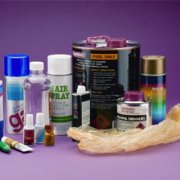Glue, gas, sniff, huff, chroming, poppers
Inhalants

Inhalants are a range of products that produce vapours which, when inhaled, may cause the person to feel intoxicated or 'high'.
Inhalants are depressant drugs.
- lowered inhibitions
- feeling of wellbeing
- excited, euphoric, giggling and laughing
- stimulation
- initial rush or high
- get “off my head”
- nitrites enhance sexual experience
- decrease social anxiety
- common peer group activity
- feeling disoriented
- decreased coordination
- visual distortions
- nausea, vomiting and diarrhoea
- headaches
- bloodshot eyes
- increased confidence leading to risky behaviour
- hallucinations
- blackout, convulsions, coma
Sudden sniffing death
- “Sudden sniffing death” has followed the use of aerosol sprays, cleaning and correction fluids, and model aeroplane cement.
- It is believed the chemicals in these products can cause heart failure, particularly if the user is stressed or does heavy exercise after inhaling. This is very rare.
The symptoms of overdose include:
- hallucinations
- drowsiness and coma.
Some inhalant-related deaths are thought to have been caused by a condition called ‘sudden sniffing syndrome’. This is a type of heart failure that can strike if the user attempts any physical exertion after inhaling.
Users have also been accidentally killed by engaging in risky behaviours, such as jumping off high buildings while under the influence.
- The drug is inhaled through the nose or mouth.
- It may be sprayed into a plastic bag, poured into a bottle or soaked into a cloth or sleeve before being inhaled.
- Some drugs are inhaled directly from the container.
- Sometimes they are sprayed directly into the mouth or nose. This can be very dangerous and cause suffocation
- The effects of inhalants may start to be felt immediately and can last for 45 minutes.
- The effects of inhalants may start to be felt immediately and can last for 45 minutes.
- As the effects of inhalants begin to wear off, an individual may experience effects such as headache, nausea and dizziness. These effects can last for several days.
- Most likely affects inhibitory neurotransmitters, similarly to other sedatives and hypnotics.
- Mesolimbic dopamine pathway activated.
- People who use inhalants on a regular basis may become dependent on them.
- They may also develop a tolerance to inhalants, which means they will need to use larger amounts to get the same effect.
- Evidence suggests that long-term use of inhalants may lead to psychological dependence.
- People who are psychologically dependent on inhalants crave them and find it very difficult to stop using them
- People who are psychologically dependent may feel an urge to use inhalants when they are in specific situations.
Withdrawal
- If a dependent individual ceases using inhalants, they may experience mild withdrawal symptoms as they get used to functioning without inhalants.
- Withdrawal symptoms begin 24-48 hours after last use and may last 2-5 days.
Symptoms may include:
- hangover effects
- headache
- nausea
- stomach pain
- feeling tired
- feeling shaky
- tremors
- muscle cramps
- hallucinations
- visual disorders (seeing spots)
- agitated, uneasy and aggressive
- hallucinations and delusions
- confusion and disorientation
- impaired judgement
- drowsiness
- bloodshot, glazed eyes and blurred vision
- irregular heart beat
- chest pain
- headaches
- drowsiness
- nosebleeds
- runny nose
- sneezing
- unpleasant breath
- slurred speech
- impaired coordination and muscle control
- nausea and vomiting
- diarrhoea
- pimples around mouth and lips; Pale appearance; Tremors
- weight loss
- tiredness
- excessive thirst
- loss of sense of smell and hearing
- problems with blood production, which may result in problems such as anaemia
- irregular heartbeat and damage to the heart muscle
- forgetfulness and memory impairment
- reduced attention and ability to think clearly and logically
- liver and kidney damage
- irritability
- hostility
- feeling depressed or feeling persecuted
- chest pain or angina
- indigestion
- stomach ulcers
Most long-term effects are not permanent and can be reverse if the individual ceases use. However, some inhalants such as cleaning products, correction fluid, aerosol sprays and petrol can cause permanent damage, especially if people use them heavily or for a long period.
Some of the chemicals in inhalants may build up in the body and irritate the stomach and intestines, cause damage to the brain, nervous system, kidneys and liver.
